
4 minute read
Illegal Wildlife Trade
Myanmar is still rich in natural resources, but they are in danger. Surrounded by key transit and destination countries, Myanmar is a source country for poachers for many species including familiar and charismatic wildlife like tigers and Asian elephants.
The recent outbreak of COVID-19 has brought the risk between zoonotic diseases - those transmitted from animals to humans - and wildlife markets into sharp focus. This rampant unchecked trade in wildlife is a risk not only to health and the economy but also to the region’s entire stability.
Advertisement
We are working with the government, international NGOs and local CSOs to strengthen law enforcement controls, increase awareness, and reduce open sales in the region. We provide information from wildlife market analysis to prevent illegal wildlife trade, hold public awareness campaigns, and facilitate capacity building workshops for departmental officers and neighboring countries’ meetings to strengthen cross-border cooperation.
With the pandemic restricting our fieldwork, we have taken the opportunity on social media platforms to raise more awareness of the importance of protecting our health and stopping buying and consuming wildlife products - with the ultimate goal of putting an end to wildlife crime to safeguard our well-being.
August 2019 - February 2019
TRANSBOUNDARY WORKSHOPS AND INFORMATION SHARING between Myanmar, Laos and Thailand in the Golden Triangle, a critical hub for illegal wildlife trade
October 2019 - January 2019
#TRAVELIVORYFREE public service announcements are rolled out in Yangon Airport and hotels across Mandalay during Golden Week, the Lighting Festival and Chinese New Year
#TravelIvoryFree targeted messages reach 1.3m people online
November 2019
launched in Mandalay
OUR NEXT STEPS
2020 Start phase two of the Fighting Wildlife Traffickign in the Golden Triangle project funded by the U.S department of State (INL)

2020 Roll out an online campaign on the “One Health” concept
2021 Conduct nation-wide campaign in partnership with WildAid, focusing on the need to protect wildlife from being poached, consumed or kept as pets
2021 Release Kantar report on national consumers and the Globescan report on Chinese traveller consumers in Myanmar “ENDING WILDLIFE CRIME IS MORE THAN SAVING WILDLIFE, IT ALSO MEANS SAVING OUR OWN WELLBEING. COVID-19 IS A WAKE-UP CALL. WE NEED TO STOP WILDLIFE CRIME TO STOP ANOTHER PANDEMIC.”
Grace Hwa Programme Manager
December 2019
INFORMAL CROSS-BORDER AGREEMENT SIGNED between Laos, Thailand and Myanmar to seal commitment for improved collaboration in tackling illegal wildlife trade
February 2020
SCULPTURES OF ENDANGERED WILDLIFE parade through Mandalay as part of the campaign
May 2020
FINAL DRAFT OF NATIONAL ILLEGAL WILDLIFE TRADE ACTION PLAN completed together with National Illegal Wildlife Trade Law Enforcement Task Force to provide authorities with a framework for targeted and coordinated work
SOUNDING THE ALARM ON ILLEGAL WILDLIFE TRADE
VOICES FOR WILDLIFE TAKES TO THE STREETS OF MANDALAY
On February 1st 2020, a golden tiger, pangolin and elephant took to the streets of Mandalay. They were there as part of the second national campaign to fight illegal wildlife trade in the region, following the success of the campaign to make Yangon illegal ivory and wildlife free. The Mandalay Campaign successfully increased public and government support to protect wildlife through increase in law enforcement action against illegal wildlife trade.
“As a key wholesale trading and transit hub for illegal wildlife products, it’s critical to stop the trade in Mandalay. If we can close the markets there by partnering with key government ministries and cultural influencers, it will do a lot to impact the overall volume of illegal wildlife being trafficked through Myanmar.” Grace Hwa, Wildlife Trade Program Manager of WWF-Myanmar.
#TRAVELIVORYFREE CAMPAIGN
Myanmar receives hundreds of thousands of Chinese tourists every year travelling to Southeast Asia over the National Golden Week and the Chinese new year. Unfortunately, many of these tourists take the opportunity to shop for illegal wildlife products. This year Myanmar joined regional WWF targeted work in the #TravelIvoryFree campaign, rolling out education and awareness raising activities to the public during Golden Week.
WWF Myanmar posted targeted messages in Burmese (aimed at the sellers) and English language on Facebook and Instagram aimed at key locations. A total of 1.3 million people were reached overall. WWF also shared #TravelIvoryFree materials with key partners who put up the public service announcements in Yangon airport and in various hotels around Mandalay.
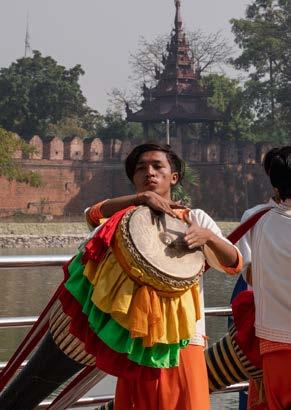
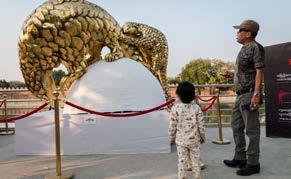
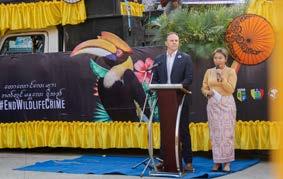
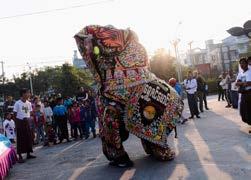
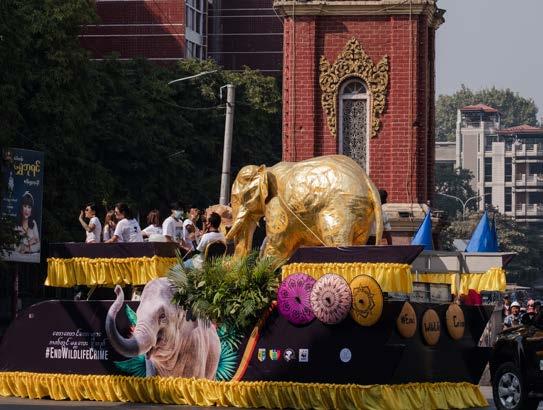
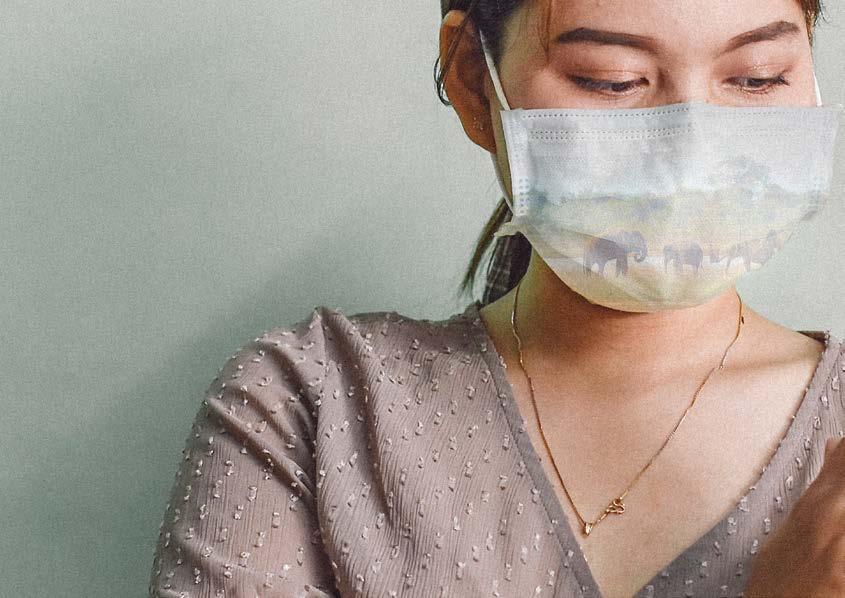
KEEP THEM WILD TO KEEP US SAFE COMING SOON.
IN 2021 WWF-MYANMAR WILL COME TOGETHER WITH WILDAID IN A NATIONWIDE CAMPAIGN TO END THE DEMAND FOR OWNING AND CONSUMING WILDLIFE IN MYANMAR. IN THE WAKE OF THE COVID-19 PANDEMIC, NEVER HAS THERE BEEN A MORE CRITICAL NEED TO KEEP THEM WILD TO KEEP US SAFE.




